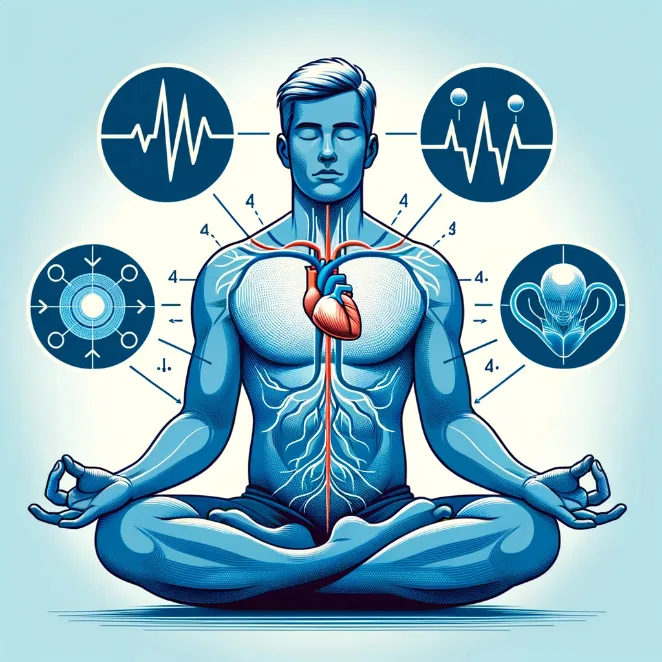
The Impact Of Meditation On Skin Health
The pursuit of healthy, radiant skin is a goal shared by many, but it's often approached with an emphasis on external factors like skincare products and routines. In our quest for the perfect complexion, we often overlook a powerful and natural tool that can contribute significantly to skin health: meditation. Beyond its well-known benefits for mental and emotional well-being, meditation can have a profound impact on the health and appearance of our skin. In this exploration, we delve into the ways in which meditation contributes to skin health, unveiling the science behind the mind-skin connection.
article by Hina Kurosawa
Stress Reduction: The Foundation Of Skin Wellness
The Skin's Sensitivity to Stress
Stress is a silent saboteur of skin health. It triggers the release of cortisol, a hormone that, when elevated chronically, can lead to various skin issues. These include acne, psoriasis, eczema, and premature aging. Meditation acts as a powerful stress-reduction tool by calming the sympathetic nervous system and promoting the relaxation response.
Mindfulness meditation, in particular, encourages individuals to be present in the moment, letting go of worries about the past and anxieties about the future. By reducing stress levels, meditation helps maintain balanced cortisol levels, mitigating the negative impact of chronic stress on the skin. As a result, individuals who incorporate meditation into their daily routines often experience a clearer, more youthful complexion.

Improved Sleep: The Skin's Time for Regeneration
The Role Of Sleep In Skin Repair
Quality sleep is essential for skin repair and regeneration. During deep sleep stages, the body engages in processes that repair and replenish skin cells, ensuring a healthy and youthful appearance. Meditation, especially practices geared toward promoting sleep, helps individuals fall asleep faster, stay asleep longer, and achieve deeper, more restorative sleep.
Mindful practices like Yoga Nidra and body scan meditation guide individuals into a state of relaxation that is conducive to sleep. By improving sleep patterns, meditation supports the skin's natural ability to heal and rejuvenate. This results in a brighter complexion, reduced under-eye circles, and a decrease in the appearance of fine lines and wrinkles.

Inflammation Reduction: Calming the Skin's Fire
The Role of Inflammation in Skin Conditions
Chronic inflammation is a common underlying factor in various skin conditions, including acne, rosacea, and dermatitis. Meditation has been shown to reduce inflammation throughout the body, which, in turn, can lead to improvements in skin health.
Mindfulness meditation, in particular, has been found to downregulate genes associated with inflammation. By regularly practicing mindfulness, individuals can help quell the inflammation that contributes to skin redness, irritation, and chronic skin conditions. A calmer mind can lead to calmer skin.

Enhanced Blood Circulation: A Healthy Glow from Within
The Importance of Blood Flow for Skin Radiance
Healthy blood circulation is vital for delivering oxygen and essential nutrients to the skin's cells. This circulation also aids in the removal of waste products and toxins. Meditation, through its ability to relax blood vessels and reduce blood pressure, enhances overall blood flow, including circulation to the skin.
Yogic breathing techniques, such as pranayama, promote efficient oxygen exchange within the body. As a result, the skin receives a rich supply of oxygen, leading to a natural, healthy radiance. Improved circulation also supports the skin's collagen production, helping to maintain its elasticity and firmness.
Nurturing Skin & Soul
Incorporating meditation into your daily routine can be a transformative journey for both your inner well-being and your skin's health. By reducing stress, improving sleep, quelling inflammation, and enhancing blood circulation, meditation fosters a radiant complexion from within. It's a reminder that true skin health isn't only skin deep; it begins with the peace and harmony found in the depths of your own mind.
Published: 12/1/2023
Modified: 12/1/2023
More predictions
Come back here soon to learn more about yourself and your future


Meditation & Lucid Dreaming
The realms of meditation and lucid dreaming are both profound and mystical in their own right. Meditation, with its deep introspection and self-discovery, and lucid dreaming, where the dreamer becomes conscious within the dream, offer unique gateways to explore the enigmatic world of the unconscious mind. In this article, we embark on a journey to understand the intricate connection between meditation and lucid dreaming, exploring how they complement each other, and how these practices can lead to profound insights into the deepest layers of our consciousness.


Meditation In Virtual Reality: A Journey Within
This article delves into the fascinating world of meditative VR experiences, exploring how they provide a unique gateway to mindfulness and self-discovery. We will examine the potential benefits, the merging of technology and spirituality, and the profound impact of these immersive experiences on the mind.


The Science Of Slow Breathing In Meditation
Breath is the essence of life, an automatic process that keeps us alive without conscious thought. Yet, it is also a powerful tool that can be harnessed to deepen our meditation practice and improve our overall well-being. Slow breathing, in particular, has gained recognition as a fundamental technique in meditation due to its profound impact on our physical, mental, and emotional states. In this article, we delve into the science behind slow breathing in meditation, exploring its physiological effects, its role in mindfulness, and its potential to reduce stress and enhance relaxation.